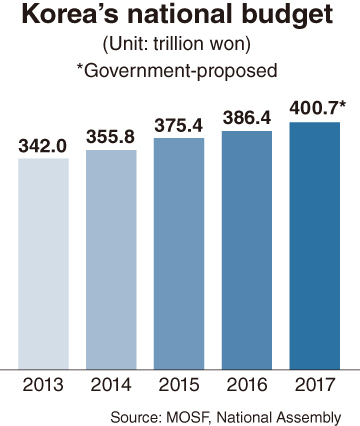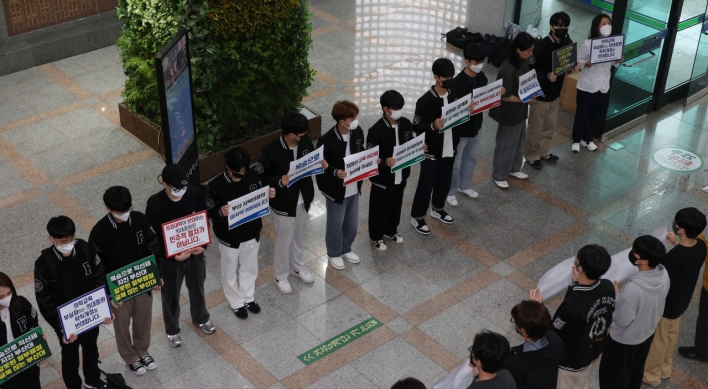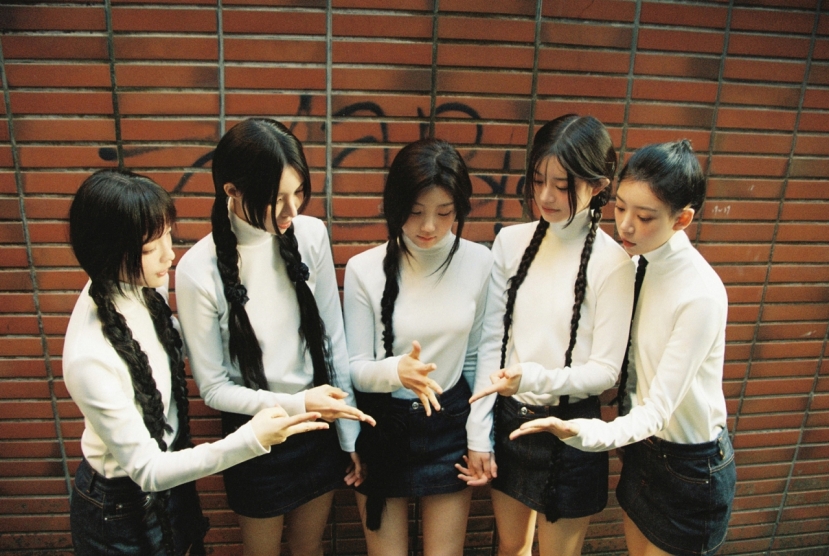South Korea’s legislators have been criticized for their slapdash deliberation on annual budget bills submitted by the government. The ongoing review of the spending plan for next year seems little different from previous ones.
More worrisome is that the issue is not getting much public attention amid the influence-peddling and corruption scandal surrounding President Park Geun-hye and her longtime confidante Choi Soon-sil.

Many experts note that it is not possible for legislators to thoroughly scrutinize next year’s budget, which is set at a record high of 400.7 trillion won ($339.1 billion), before the Dec. 2 deadline for the passage of the bill.
The parliamentary budget deliberation began in late October, giving lawmakers slightly more than a month to conduct a review. A lack of expertise among budget committee members, who are chosen mainly out of political considerations, is cited as another possible setback.
A subcommittee of the parliamentary committee on budget and settlement started reviewing the 2017 budget plan on Nov. 7. After being endorsed by the 50-member committee, the bill is to be submitted to a plenary session of the National Assembly early next month for final approval.
Parliamentary standing committees left budgets allocated for government agencies almost intact during their deliberation before transferring them to the budget committee.
Rep. Kim Dong-chul, an opposition lawmaker who sits on the budget panel, said each standing committee should have been asked to conduct their review again.
But members of the budget committee also seem far from able to make a thorough review as they are preoccupied with issues surrounding the Choi scandal.
“All questions were related to suspicions Choi and her associates may have been involved in this or that spending plan,” said a senior administration official who attended a recent session of the budget panel, asking not to be named.
Experts note that lawmakers on the budget committee should focus on deliberating budget issues for the coming weeks, rather than being preoccupied with the escalating political turmoil.
“It would be a dereliction of duties for legislators to pass the budget bill without proper scrutiny,” said Oh Jung-geun, a professor of finance at Konkuk University in Seoul.
The 2017 budget plan calls for, among other things, cutting expenditure on infrastructure projects by 8.2 percent and increasing spending on health and welfare programs by 5.3 percent.
Experts, such as Oh, say the idea of reducing outlays on expanding social overhead capital needs to be re-evaluated given that other major countries have been seeking to boost their economies by increasing investment in renovating and building infrastructure facilities.
They also note caution needs to be taken when expanding welfare spending, which is hard to reduce again once it has been allocated as part of the annual budget. Welfare expenditure is set to surpass 130 trillion won for the first time next year.
Ironically, the ongoing political turmoil may help the budget bill pass by the legal deadline.
The conservative ruling Saenuri Party has suggested it would try to block the passage of the bill in a bid to thwart opposition parties’ push to raise taxes for large corporations and high income earners.
Engulfed in an interparty feud over how to settle the political crisis, the party may not be able to pay heed to the matter.
The three opposition parties, which combined hold an absolute majority in the 300-member parliament, are postured to pass the tax code revision bills along with the budget plan at the closure of the ongoing parliamentary session, with National Assembly Speaker Chung Sye-kyun set to take a stance in favor of them.
This would be in sharp contrast to previous cases, in which opposition lawmakers held the passage of a budget bill hostage to other political issues, putting them in a position to take more responsibility for ensuring the budget deliberation will be made in a thorough and balanced manner.
Compared to efforts to secure as much money as possible in the annual budget, government ministries have been relatively neglectful of carrying out specific spending programs.
According to a recent report from the Ministry of Strategy and Finance, 75.7 percent of fiscal spending planned for this year was put into practice in the first nine months of the year, down 1.9 percent from the same period last year.
Economists indicate fiscal expenditure programs should be implemented without being affected by the ongoing political turbulence to avoid precipitating the protracted economic slowdown.
By Kim Kyung-ho (khkim@heraldcorp.com)
More worrisome is that the issue is not getting much public attention amid the influence-peddling and corruption scandal surrounding President Park Geun-hye and her longtime confidante Choi Soon-sil.

Many experts note that it is not possible for legislators to thoroughly scrutinize next year’s budget, which is set at a record high of 400.7 trillion won ($339.1 billion), before the Dec. 2 deadline for the passage of the bill.
The parliamentary budget deliberation began in late October, giving lawmakers slightly more than a month to conduct a review. A lack of expertise among budget committee members, who are chosen mainly out of political considerations, is cited as another possible setback.
A subcommittee of the parliamentary committee on budget and settlement started reviewing the 2017 budget plan on Nov. 7. After being endorsed by the 50-member committee, the bill is to be submitted to a plenary session of the National Assembly early next month for final approval.
Parliamentary standing committees left budgets allocated for government agencies almost intact during their deliberation before transferring them to the budget committee.
Rep. Kim Dong-chul, an opposition lawmaker who sits on the budget panel, said each standing committee should have been asked to conduct their review again.
But members of the budget committee also seem far from able to make a thorough review as they are preoccupied with issues surrounding the Choi scandal.
“All questions were related to suspicions Choi and her associates may have been involved in this or that spending plan,” said a senior administration official who attended a recent session of the budget panel, asking not to be named.
Experts note that lawmakers on the budget committee should focus on deliberating budget issues for the coming weeks, rather than being preoccupied with the escalating political turmoil.
“It would be a dereliction of duties for legislators to pass the budget bill without proper scrutiny,” said Oh Jung-geun, a professor of finance at Konkuk University in Seoul.
The 2017 budget plan calls for, among other things, cutting expenditure on infrastructure projects by 8.2 percent and increasing spending on health and welfare programs by 5.3 percent.
Experts, such as Oh, say the idea of reducing outlays on expanding social overhead capital needs to be re-evaluated given that other major countries have been seeking to boost their economies by increasing investment in renovating and building infrastructure facilities.
They also note caution needs to be taken when expanding welfare spending, which is hard to reduce again once it has been allocated as part of the annual budget. Welfare expenditure is set to surpass 130 trillion won for the first time next year.
Ironically, the ongoing political turmoil may help the budget bill pass by the legal deadline.
The conservative ruling Saenuri Party has suggested it would try to block the passage of the bill in a bid to thwart opposition parties’ push to raise taxes for large corporations and high income earners.
Engulfed in an interparty feud over how to settle the political crisis, the party may not be able to pay heed to the matter.
The three opposition parties, which combined hold an absolute majority in the 300-member parliament, are postured to pass the tax code revision bills along with the budget plan at the closure of the ongoing parliamentary session, with National Assembly Speaker Chung Sye-kyun set to take a stance in favor of them.
This would be in sharp contrast to previous cases, in which opposition lawmakers held the passage of a budget bill hostage to other political issues, putting them in a position to take more responsibility for ensuring the budget deliberation will be made in a thorough and balanced manner.
Compared to efforts to secure as much money as possible in the annual budget, government ministries have been relatively neglectful of carrying out specific spending programs.
According to a recent report from the Ministry of Strategy and Finance, 75.7 percent of fiscal spending planned for this year was put into practice in the first nine months of the year, down 1.9 percent from the same period last year.
Economists indicate fiscal expenditure programs should be implemented without being affected by the ongoing political turbulence to avoid precipitating the protracted economic slowdown.
By Kim Kyung-ho (khkim@heraldcorp.com)
-
Articles by Korea Herald







![[KH Explains] Can tech firms' AI alliances take on Nvidia?](http://res.heraldm.com/phpwas/restmb_idxmake.php?idx=644&simg=/content/image/2024/05/07/20240507050619_0.jpg&u=)


![[Grace Kao, Meera Choi] Has money displaced romance on dates?](http://res.heraldm.com/phpwas/restmb_idxmake.php?idx=644&simg=/content/image/2024/05/06/20240506050233_0.jpg&u=)







![[K-pop’s dilemma] Time, profit pressures work against originality](http://res.heraldm.com/phpwas/restmb_idxmake.php?idx=652&simg=/content/image/2024/05/08/20240508050705_0.jpg&u=20240508171126)
